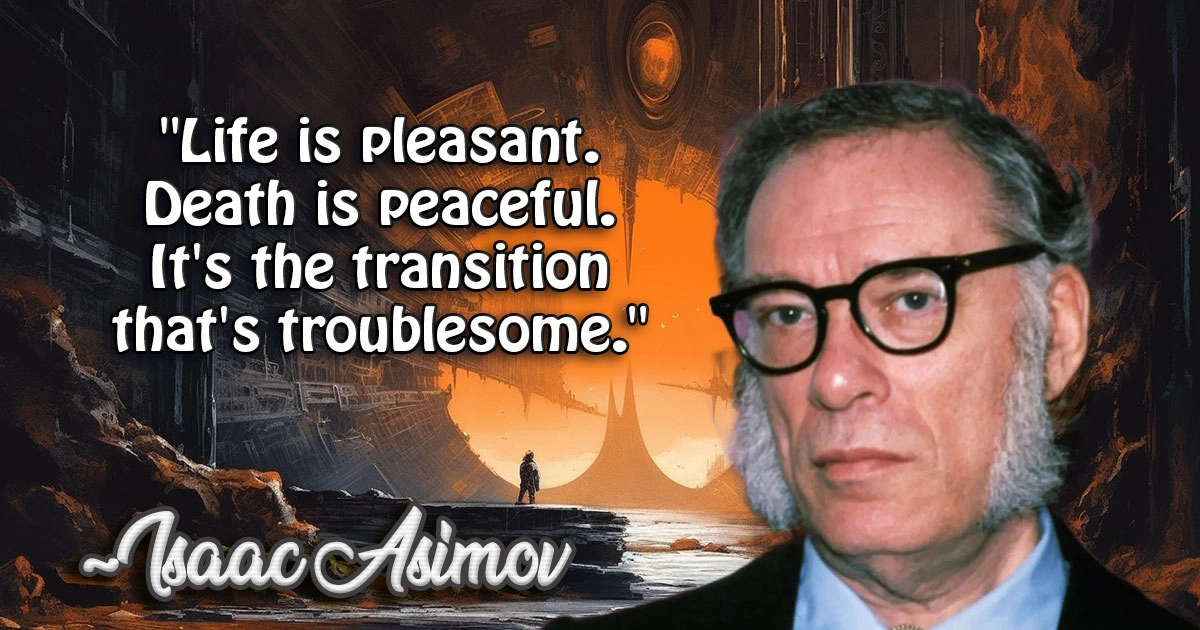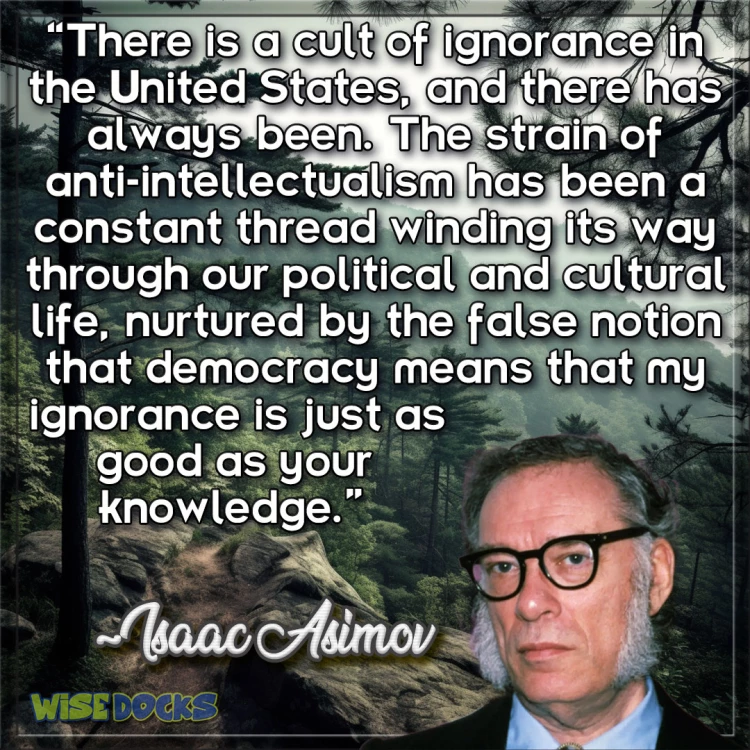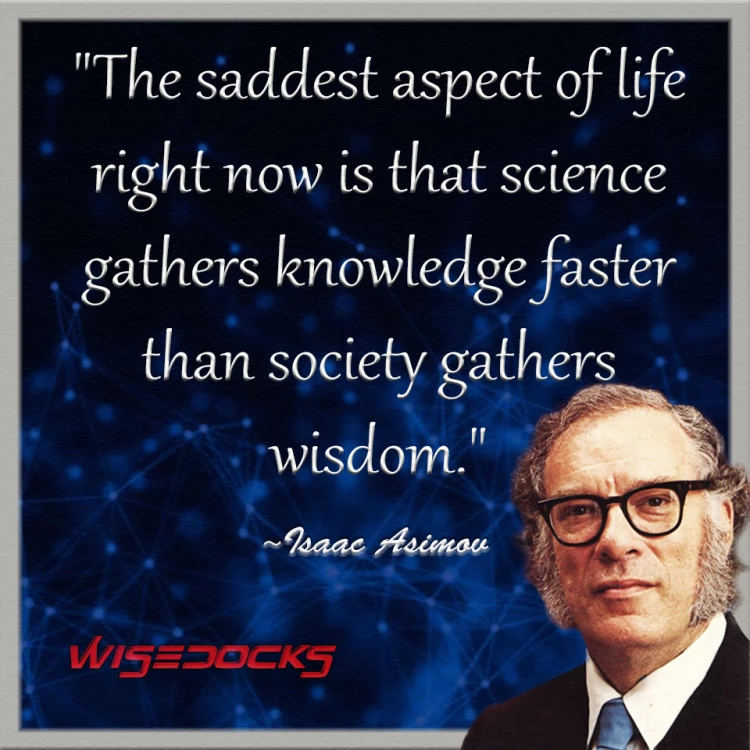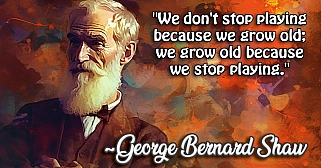Isaac Asimov: Visionary of Science Fiction and Ethical Futurism

Isaac Asimov
Isaac Asimov was a child of immigrants, born on January 2, 1920, in Petrovichi, Russia. His family moved to the United States when he was just three years old, seeking a better life. Growing up in Brooklyn, New York, young Isaac was surrounded by books. His parents owned a candy store that also sold magazines and newspapers, a perfect setting for a boy with an insatiable curiosity and an appetite for knowledge.

Asimov's early life was marked by his profound love for reading. He devoured everything from classic literature to pulp science fiction magazines. This passion for reading soon transformed into a talent for writing. By the time he was a teenager, he was already penning his own stories. His first published work, a short story titled "Marooned off Vesta," appeared in the science fiction magazine Amazing Stories in 1939, when Asimov was just 19 years old.
While his early forays into writing were promising, Asimov's path was not without obstacles. He attended Columbia University, where he earned a Bachelor's degree in Chemistry in 1939 and later a Ph.D. in Biochemistry in 1948. During this time, he continued to write and submit stories, slowly building his reputation in the science fiction community.

Career
In the 1940s, Asimov's career took a significant turn when he began contributing to Astounding Science Fiction magazine, edited by John W. Campbell. It was under Campbell's mentorship that Asimov developed some of his most famous works. The "Robot" series, starting with "Robbie" in 1940, introduced the world to Asimov's Three Laws of Robotics, a set of ethical guidelines designed to govern the behavior of robots and ensure they did not harm humans. These laws became a cornerstone of Asimov's writing and had a profound influence on the science fiction genre.
Asimov's "Robot" series was revolutionary, not just for its innovative ideas but for its exploration of the ethical and moral implications of advanced technology. The stories were populated by robots that were more than mere machines; they had personalities, emotions, and, most importantly, a sense of morality. These narratives challenged readers to think deeply about the relationship between humans and technology, a theme that remains relevant today.

In addition to the "Robot" series, Asimov created another seminal work during the 1940s: the "Foundation" series. The first book, "Foundation," published in 1951, introduced the concept of psychohistory, a fictional science that combined history, sociology, and mathematics to predict the future of large populations. The series follows the efforts of Hari Seldon, a mathematician, to preserve knowledge and shorten the predicted period of chaos following the collapse of the Galactic Empire. The "Foundation" series was a monumental achievement in science fiction, blending complex characters, intricate plots, and profound philosophical questions.
Asimov's ability to weave together scientific concepts with compelling storytelling made him one of the most respected and beloved writers in the genre. His works were not just entertaining; they were thought-provoking, challenging readers to consider the ethical dimensions of scientific advancement.

Despite his success in science fiction, Asimov's talents were not confined to one genre. He was a prolific writer, authoring or editing over 500 books and an estimated 90,000 letters and postcards. His works spanned various genres, including mystery, fantasy, and non-fiction. He wrote popular science books that made complex scientific concepts accessible to the general public, such as "The Intelligent Man's Guide to Science" and "Asimov's New Guide to Science." These books showcased his ability to explain intricate ideas clearly and engagingly, further cementing his reputation as a master communicator of science.
Asimov's non-fiction works were instrumental in educating and inspiring a generation of readers. His clear, concise writing style and his ability to break down complex topics into understandable segments made science accessible and exciting. He had an extraordinary talent for making his readers feel like they were part of a grand adventure of discovery.
Beyond his literary achievements, Asimov was known for his larger-than-life personality. He was a man of boundless energy, curiosity, and enthusiasm. His quick wit and sharp intellect made him a sought-after speaker and a beloved figure at science fiction conventions. He had a remarkable ability to connect with people, whether through his writing or in person.
Asimov's influence extended beyond his lifetime. His works have inspired countless writers, scientists, and thinkers. The ethical dilemmas and futuristic visions he presented continue to resonate in contemporary discussions about artificial intelligence, robotics, and the future of humanity. His Three Laws of Robotics, in particular, have become a foundational concept in discussions about the ethical design and use of autonomous systems.
In his personal life, Asimov was known for his warmth and generosity. He married Gertrude Blugerman in 1942, and they had two children, David and Robyn. The couple divorced in 1973, and Asimov later married Janet Jeppson, a psychiatrist and writer. Despite his busy career, Asimov always found time for his family and friends. He was known for his playful sense of humor, often entertaining guests with his stories and anecdotes.
Isaac Asimov's contributions to literature and science were recognized with numerous awards and honors. He received the Hugo, Nebula, and Bram Stoker Awards, among others. In 1987, he was named a Grand Master of the Science Fiction Writers of America, a testament to his lasting impact on the genre.
Asimov's legacy is not just in the vast body of work he left behind but in the ideas and questions he inspired. His writing continues to challenge and inspire new generations of readers to think critically about the future and the role of technology in our lives. Asimov once said, "I do not fear computers. I fear the lack of them." This statement encapsulates his belief in the potential of technology to improve human life, a belief that permeated his work and continues to influence our thinking today.
Isaac Asimov passed away on April 6, 1992, but his ideas and stories live on. He was a visionary, a storyteller, and a teacher. His work reminds us that science fiction is not just about predicting the future but about exploring the possibilities and ethical dilemmas that come with it. Through his writing, Asimov invited us to imagine new worlds and, in doing so, better understand our own.
In the end, Isaac Asimov's greatest gift was his ability to make us think. His stories challenge us to consider the consequences of our actions, the ethical dimensions of our choices, and the endless possibilities of human ingenuity. As we continue to grapple with the rapid advancements in technology, Asimov's work remains a guiding light, reminding us to approach the future with curiosity, caution, and a sense of wonder.


